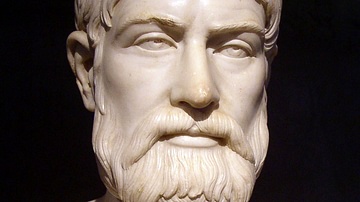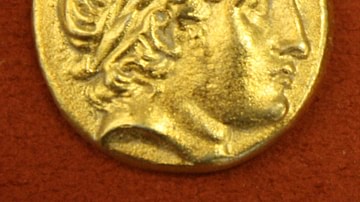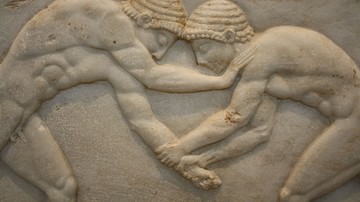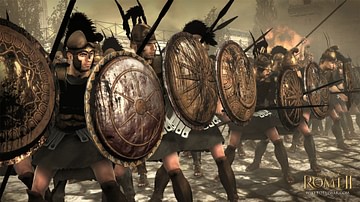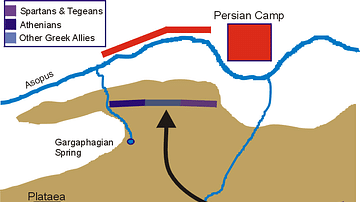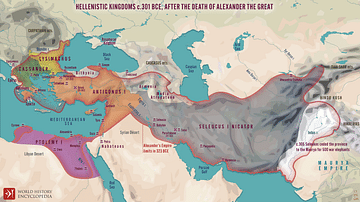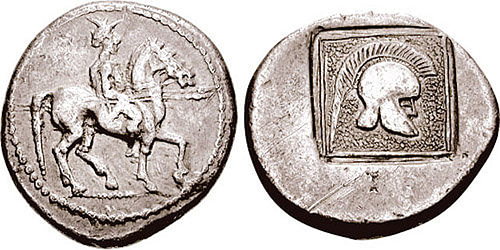
Alexander I of Macedon, also known as Alexander I the Philhellene ('friend of the Greeks') or 'The Wealthy', was king of ancient Macedon from around 498 to 454 BCE. He is known for the role he played in the second Persian invasion of Greece (480 BCE) during the Persian wars, in which, according to the Greek historian Herodotus, he secretly supported the Greeks against the Persians, but also for his participation in the Olympic Games and his attempt to expand his kingdom and reform the Macedonian army.
A Ruthless Prince
Member of the Argead Dynasty which ruled in Macedonia from the 8th century BCE, Alexander was the son of King Amyntas I. Little is known about his early life, but it is reasonable to think that he was educated as a typical Macedonian prince, practicing hunting, and receiving military training. Herodotus tells us of an important episode that must have occurred around 510 BCE, showing the personality of Alexander while he was still a young prince.
In that year, Megabazus, one of the most powerful generals under the Great King of Persia Darius I (r. 522-486 BCE), sent an embassy to Amyntas, asking for “earth and water”, as a sign of submission to the Persian rule. The king accepted, offering a banquet to seven Persian envoys, who quickly started to get drunk and asked for female company. Some Macedonian women were therefore brought to the feast, and soon after were molested by the Persian guests. Enraged by the behavior of the Persians, Alexander devised a clever and treacherous plan to kill them. The young prince ordered his friends to disguise themselves as women, introducing them at the party as a 'special gift' for his foreign guests. Soon after, they slaughtered the Persians.
According to Herodotus:
Alexander caused a Macedonian man in the guise of a woman to sit by each Persian, and they, when the Persians attempted to lay hands on them, slew them. So these perished by this fate, both they themselves and their company of servants; for there came with them carriages and servants and all the usual pomp of equipage, and this was all made away with at the same time as they. (V, 20 [5]; 21 [1])
The assassination of the envoys was kept secret, but soon the Persians tried to find out what had happened to their missing men. The inquiry was managed by a general named Bubares. Alexander once again demonstrated his cunning personality, bribing the Persian general with a large sum of money and offering him his sister Gygea as a spouse.
The marriage between Alexander's sister and Bubare is considered plausible by scholars, but most historians believe that the assassination of the Persian envoys is false. Herodotus does not provide relevant details, such as the names of the nobles slaughtered by Alexander, and for some, it is unlikely that a young prince like him, without the consent of his father, dared to commit such a violent act jeopardizing the newly established diplomatic relations with the Persian Achaemenid Empire. In brief, it is believed that the story reported by Herodotus had been invented by sources close to Alexander, to increase his fame and highlight his crafty intelligence.
A Secret Ally of the Greeks?
When Alexander ascended to the throne, after the death of his father (c. 498 BCE), Macedon continued to be a Persian protectorate, and in 492 BCE the new king submitted to the Persian general Mardonius. When in 480 BCE, Xerxes I invaded Greece with a massive army, hoping to annex the city-states, Alexander had to provide the invaders with military and logistical support. However, according to Herodotus, he secretly helped the Greeks during the war.
While the army of the Greek coalition was settled in the Tempe valley in Thessaly (northern Greece), Alexander warned them of the danger of their vulnerable strategic position, inducing them to withdraw. Later, after the Battle of Salamis (480 BCE), he was sent by Mardonius to lead a diplomatic mission in Athens, aiming at persuading the Athenians to sign a peace treaty with Xerxes. Alexander was chosen for the mission as he was a 'friend' of Athens and had the honorary title of 'proxenos' (friend of the city), conferred to him after having helped the Athenians in the past with supplies of timber to build their fleet, presumably before the outbreak of the second Persian war. The peace offer, however, was firmly rejected.
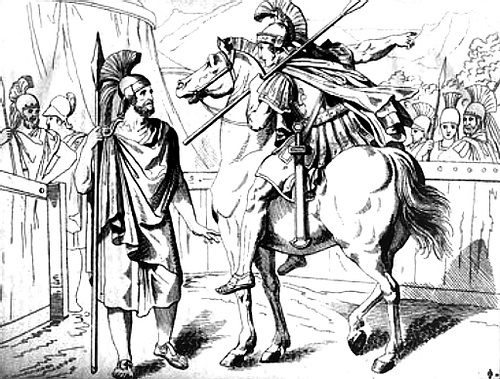
Another event demonstrates Alexander's Machiavellian attitude during the second Persian invasion. In 479 BCE, the night before the Battle of Plataea, the Macedonian king allegedly visited the Greek camp, revealing Mardonius' battle plans to the Greeks.
According to Herodotus, he spoke again to the Athenians:
Athenians, I lay up these words of mine as a trust to you, charging you to keep them secret and tell them to no one except only to Pausanias, lest ye bring me to ruin: for I should not utter them if I did not care greatly for the general safety of Hellas, seeing that I am a Hellene myself by original descent and I should not wish to see Hellas enslaved instead of free. I say then that Mardonius and his army cannot get the offerings to be according to their mind, for otherwise ye would long ago have fought. Now however he has resolved to let the offerings alone and to bring on a battle at dawn of day; for, as I conjecture, he fears lest ye should assemble in greater numbers. Therefore prepare yourselves; and if after all Mardonius should put off the battle and not bring it on, stay where ye are and hold out patiently; for they have provisions only for a few days remaining. And if this way shall have its issue according to your mind, then each one of you ought to remember me also concerning liberation, since I have done for the sake of the Hellenes so hazardous a deed by reason of my zeal for you, desiring to show you the design of Mardonius, in order that the Barbarians may not fall upon you when ye are not as yet expecting them: and I am Alexander the Macedonian. (IX,45)
The Greek triumph over the Persians at Plataea signaled the end of the war, and after that event Alexander decided to side with the Greeks, helping them to drive out the Persians from their territory.
The truthfulness of all these episodes mentioned by Herodotus is partially questioned by some historians, but what is certain is that both during and after the withdrawal of the Persians, Alexander demonstrated excellent diplomatic skills, maintaining the unity of his kingdom and laying the foundation of its future growth.
Friend of the Poets & Olympic Champion
A significant event in Alexander's life was his participation in the Olympic Games, which occurred around 496 BCE. Initially, he was about to be excluded by the other participants, since the games were reserved only to Greeks, who considered the Macedonians 'barbarians'. Alexander, however, proved that his dynasty originated from Temenus, the ancient king of Argos believed to be a direct descendant of the legendary Greek hero Hercules, and was therefore allowed to take part in the Olympics.
Alexander won in the discipline of the stadion, a prestigious running race that was part of the five Pentathlon events. His triumph was celebrated by the famous Theban poet Pindar, who wrote a poem in his honor, of which we have some fragments (Pindar, fr. 120-121 Maehl):
You who bear the same name as the powerful Darnanides
fearless son of Amintas
... befits the valiant being celebrated ...
... with more beautiful songs.
This alone procures immortal honors,
while the fine venture dies if kept silent
Pindar visited the Macedonian court as a guest and his friendship with Alexander remained etched in the memory of the Macedonian kings. Indeed, two centuries later, during the destruction of Thebes (335 BCE), Alexander the Great (356-323 BCE) had only spared the former house of Pindar, as a sign of respect for the special relationship of the poet with his ancestor. Pindar was not the only poet who had contacts with Alexander I. The Macedonian king also supported Bacchylides, who is likewise believed to have dedicated some poems to the king.
Alexander's participation in the Olympic Games was later used to demonstrate his attachment to the Hellenic culture. The cultural proximity to the Greeks is also proven by the fact that he commissioned golden statues in Delphi and Olympia, the two most important Hellenic sanctuaries.
Expansion & Reform
While he was in power as king of Macedon, Alexander was able to take advantage of the political circumstances and turn them in his favor by annexing various territories. He took control of the eastern region of Strymon Valley, rich in quarries, and also conquered the strategic port city of Pydna on the Thermaic Gulf. Despite his title of proxenos, Alexander's territorial ambitions had often put him at odds with Athens, contending the control of large areas of the Chalkidiki and Thrace.
From a geopolitical perspective, the strategic aim of Alexander was to liberate Macedon from the influence of its cumbersome neighbors. Not only there were the Athenians, coming from the sea, but also the Thracians, who possessed rich mines and put pressure on the Macedonian kingdom from the east, as well as Illyrian and Paeonian tribes, known for their raids on the western and northern borders.
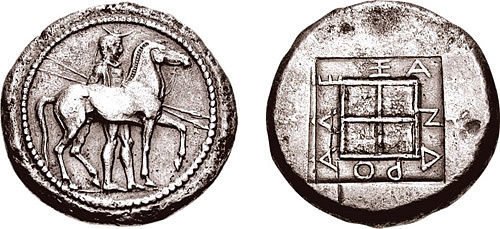
To achieve this goal, Alexander introduced an important military reform with the creation of the future backbone of the Macedonian army: the hetairoi (Companions) and the pezhetairoi (Foot companions).
According to a famous fragment of the Greek historian Anaximenes of Lampsacus:
After making the most renowned men accustomed to serving as cavalry, he [Alexander] gave them the name of hetairoi; but the majority, that is the foot, he [...] designated them pezhetairoi. He did this in order that each of the two groups, by sharing in the royal Companionship, should be always exceedingly loyal to him. (FGrH 72 F 4)
Scholars think that the cavalry unit of the hetairoi, which was formed by loyal noblemen, could be an imitation of similar Persian units. As for the infantry of the pezhetairoi, this was composed of “spear bearers”, but we know little about their equipment, later designed on the model of the hoplites of the Greek city-states.
Legacy
Alexander I died in 454 BCE, leaving the throne to his elder son, Alcetas. We do not know the exact circumstances of his death, even though the Roman historian Curtius Rufus seems to suggest that he was assassinated. The nickname of “Philhellene”, by which he is still known, is mentioned for the first time only in the 2nd century CE by the historian Dio Chrysostom.
The reign of Alexander lasted almost 50 years, during which the kingdom of Macedon grew in size and achieved prosperity. Under his cunning leadership, Macedon became a unified state with a coherent identity. This was a period of intense commerce, characterized by the development of trade through the Balkan area and the coast of Thrace and Chalkidiki. Alexander is indeed mentioned by Herodotus as a rich ruler, who "drew a daily revenue of a talent of silver" from the mines on Mount Dysoron (V, 17). This affluence, which gained him also the nickname of 'The Wealthy', is validated by the minting of several series of silver coins.
Throughout the first half of the 5th century BCE, there was also an artistic resurgence in the area, as attested by the golden objects and coins later found, and a change in the Macedonian way of life. From being transhumant shepherds, many settled in cities while others became farmers. Overall, they slowly started to be recognized as part of the Greek world. For Alexander himself, being recognized by the major sanctuaries of Greece was a 'revolutionary' gesture, which laid the foundation for the future dominance of Philip II of Macedon (r. 359-336 BCE).

